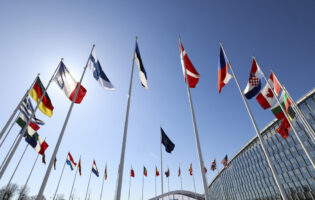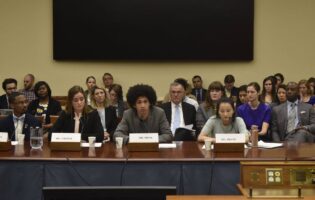New Ground for Cooperation: The Arab Spring as a Turning Point for EU-Turkey Relations

Rana Deep Islam
EY
Dr. Rana Deep Islam works as a Business Development Executive in the Government and Public Sector for Germany, Switzerland, and Austria at EY, one of the largest professional services firms. Prior to joining EY he worked as a campaign manager for the SPD’s chancellor candidate Martin Schulz during his campaign in the run-up to the German federal elections in 2017. Prior to that, he was in charge of the management of the European project portfolio at Stiftung Mercator and gained further professional experience at the European Parliament, the School of Advanced International Studies (SAIS), and the Gesellschaft für Internationale Zusammenarbeit (GIZ). Rana holds an MA from the College of Europe in Bruges and a PhD from the University of Erlangen-Nurnberg. In his PhD studies, Rana compared the Middle East politics of the EU and Turkey. He was a DAAD/AICGS Research Fellow in May and June 2011. Rana publishes frequently in academic journals and media on European affairs and German politics.
Though politicians use the word “historic” in a fairly inflationary way, there is no better terminology for describing what the international community is witnessing in the Middle East and North Africa (MENA). The uprisings that are sweeping over the region astonished Western observers as they replaced an existent narrative. After the 9/11 terrorist attacks, the MENA region appeared to be an area of insecurity and volatility. Such an image was even reinforced by autocratic political systems that seemed to be resistant to all reformatory efforts (turning them into ideal partners for Western politicians, who increasingly came to terms with the regional status quo). Starting with the self-immolation of the Tunisian vendor Mohammed Bouazizi, the Arab demonstrations made one thing clear: Change is possible!
Soon, observers labeled the events to be an “Arab Spring.” Others recognized a “fourth wave of democratization,” and decision-makers stood up for a “Mediterranean Marshall Plan.” It is interesting to see that all those wordings and explanatory patterns recall a Western reminiscence of Cold War episodes. However, what is happening in the Arab world has only little to do with the old story of an East-West antagonism. The Arab Spring, if we call it that way, is a case sui generis. Accordingly, it should not be addressed with the old-fashioned tool box of international relations.
Old Risks and a New Kid in Town
In the beginning a domino effect seemed to wash away one Arab regime after another. However, in the meantime euphoria had to give way to a rather dim outlook. Removing a ruling elite from power is a different story from the establishment of a sustainable political system. Media and academics are questioning whether the Arab Spring is nowadays turning into an Arab Winter. In his first public speech about the Arab awakening in May 2011, President Barack Obama rightly pointed out: “But it will be years before this story reaches its end.”[1] The region is far from being a zone of peace and stability. Risks and the respective threat perception that dominated the transatlantic Middle East discourse in the past will therefore remain on top of the agenda: international terrorism, regional conflicts, the spread of WMD, failing states, and organized crime will not lose their virulence in the near future. Furthermore, it needs to be added that the youth bulge and a simultaneous lack of economic prospects in MENA countries will sustain a migratory pressure that especially impacts the EU and its member states.
At the same time, there is a change in power structures. In an age of financial turmoil and military overburdening (Afghanistan, Iraq, Libya) the EU and the U.S. may have reached their apparent limits in shaping global affairs. In contrast there is one player that could steadily enlarge its scope of influence: Turkey. The country, too, was surprised by the intensity of the Arab demonstrations and their call for reform. Under Turkish foreign minister Ahmet Davutoğlu the country pursued a policy that proactively embraced autocratic rulers. Davutoğlu’s “zero-problem policy” therefore has to be seen as a “zero problem policy with regimes.” For a long time Ankara turned a deaf ear to people’s needs and issues of civil society in its neighborhood. The doubtful state of Turkish rule of law explains to a certain degree why the country has neither the capabilities nor the credibility to act as a staunch promoter of political values like democracy, human rights, and civil liberties. It speaks volumes that Reporters without Borders lists Turkey only on rank 148 out of 179.
In spite of Turkey’s upgradable democratic credentials, the country enjoys increasing popularity among the people of the region, illustrated by a survey of the Istanbul-based think tank TESEV, the Turkish Economic and Social Studies Foundation. Eighty percent of respondents have a favorable opinion of Turkey; 77 percent agree that Turkey is of positive influence for maintaining peace in the region; and 61 percent believe that the country could serve as a model to the Middle East. It is noticeable that only 7 percent of interviewees think that Turkey’s imperial heritage, namely its Ottoman history, prevents the country from being a model. It seems that historical prejudices and stereotypes, which complicated Turkish-Middle East rapprochement in the past, are left behind. The numbers underline the increased relevance Turkey carries in the regional arena.
Indeed, the country is about to translate its popularity into political influence on an operative level. At the beginning of the Syrian uprisings in 2011 the AKP government hesitated to condemn the Assad regime for its relentless crackdown. Meanwhile, Turkey is in the driver’s seat and became one of Syria’s staunchest critics. The fact that Turkey is of special importance vis-à-vis Syria is also due to their common 900 kilometer border. Syrian refugees find sanctuary in Turkey, in addition to the Free Syrian Army that is composed of soldiers and security personnel who dissociated from the Assad system who receive safe haven on Turkish soil. Not least is the Syrian National Council, a quasi government with increasing political authority that is hosted in Istanbul.
The crucial role Turkey is playing in the Syrian conflict is increasingly recognized by Western observers. Experts call on Ankara to actively intervene by providing weapons, training, money, and intelligence to the Syrian rebels. The Turkish air force could also deliver surveillance and support for setting up a buffer zone that enables humanitarian aid. In the follow up to the Munich Security Conference in 2012 German foreign minister Guido Westerwelle came up with the idea to establish a contact group in which Turkey needs to play a vital role.
No matter what, the country does not have any other choice than exerting growing humanitarian, civilian, diplomatic, and, if the chips are coming down, military pressure in order to enforce change in Syria.
Imperative for Cooperation
Turkey is a major mover and shaker in its Middle Eastern neighborhood that cannot be excluded from the regional equation. Though European decision-makers would agree to that statement, we are witnessing nothing less than the deepest crisis in the EU-Turkey relationship. The accession negotiations literally face a deadlock. European politicians as well as Turkish representatives do not even try to cover their frustration. Both sides verbally and non-verbally express that Turkish EU integration is only a very low priority on their respective foreign policy agendas. Reasons for this stagnancy are multifaceted. One explicit reason is the still unresolved Cyprus question. According to Marc Otte, the EU’s former special representative to the Middle East peace process, Cyprus is at the center of any kind of further EU-Turkey cooperation vis-à-vis the Arab world. When experts accuse the EU of lacking strategic thinking, the Mediterranean island is indeed the evidence. By letting the divided country accede in 2004, the EU integrated a conflict zone into its joint federation. Brussels missed the historic window of opportunity to combine the island’s accession with the prerequisite of reconciliation between the two ethnic groups of Turkish and Greek Cypriots. The latter are now able to block Turkish-EU rapprochement entirely through their veto power. The EU with its twenty-seven member states and its sixty year long history of integration is held hostage by an insular state and its ancient conflict that involves a population of just one million inhabitants in what equates to the size of the city of Cologne.
In addition, the EU’s institutional set up is of a complicating nature. The Cypriot division was formally dealt with under the heading of the EU’s Directorate-General for Enlargement. European-Turkish foreign policy cooperation, however, is negotiated by the newly established European External Action Service. As a consequence, Ankara’s possible contribution to the EU’s Middle East performance permanently runs the risk of being undermined by the millstone of European bureaucracy. The UK, France, and Germany in particular should now take up their responsibility for mediation in order to finally get the Cyprus challenge resolved for the sake of EU-Turkey relations.
Considering political risk as an umbrella terminology for any kind of political and societal instability causing unknowns—especially for the business sector—the European Union seems to give an example of how to best face such a challenge. It is part of the EU’s collective identity that dangers can only be appropriately mitigated through the institutionalized bonds of cooperation and integration. Among others factors, this explains why Europe has always tried to approach the Middle East and the Mediterranean by the establishment of institutional patterns, e.g., the Union for the Mediterranean and the European Neighborhood Policy, respectively.
With regard to the European-Turkish agenda, cooperation is also in the common interest of both sides. The EU needs a conduit like Turkey that is able to maintain channels of dialogue to crucial actors in Middle Eastern politics, for instance Hamas, Hezbollah, the Syrian opposition, and the Tehran regime. On the other hand, Turkey knows well that its rising reputation on Arab streets is deeply linked with its distinguished Western and European character. As Soner Cagaptay from the Washington Institute for Near East Policy points out in an article for the Los Angeles Times, “Ultimately, Turkey came to realize that its strategic value to the Middle East is not rooted in the fact it’s a Muslim power—the region has many such states—but that it is a Muslim power with strong ties to the U.S., access to NATO technology and muscle, and the ability to sit at the table with the Europeans.”[2]
What Can Cooperation Look Like?
As a candidate country for membership, Turkey currently has the possibility to officially join EU declarations of the Common Foreign and Security Policy. What Turkish decision-makers criticize, however, is the inability to also actively shape those decisions, turning it into a take-it-or-leave-it instrument. It needs to be mentioned that efforts of closer cooperation between Ankara and Brussels have been made in the past. However, they remained without any effect. There is a political dialogue on a minor administrative level. Unfortunately, it turned out to be a dead body that was not able to advance political relations between the two sides. In the world of diplomacy it is pretty evident that appreciation relates to the form of protocol. This is why any further initiative needs to take place on the level of heads of state and government. Europeans finally need to show Turkey that the country is regarded as of distinguished value.
A strategic dialogue could be implemented by associating the Turkish foreign minister with the foreign affairs council of the European Union. There have been attempts to do so on a case to case basis in the past. Such form of inclusion, however, failed due to Greek-Cypriot opposition, which again underlines the need to finally resolve the Cyprus question, as mentioned above. Instead, the Turkish minister must be tied to EU institutions on a contractual basis in order to protect the EU-Turkey relationship from the ups and downs of day to day politics. Ankara would gain direct access to EU decision-making while the EU would have the chance to include a regional strategic asset into its foreign policy domain.
Such a treaty-based cooperation would have a further advantage of an institutionalized socialization. Bringing the two actors together could help to reduce current stereotypes and cultural prejudices. Just the opposite, fixed cooperation offers the possibility of a genuine European-Turkish esprit de corps that perceives itself as a foreign policy community.
On an operative basis, the two sides would be better off to combine their capabilities and capacities, especially due to financial austerity that increasingly affects European nation states. Such a joint approach should include the sharing of intelligence, pooling military assets, conducting common election observation missions, best practice seminars for Turkish authorities in the field of border management, and, last but not least, cooperation in the field of humanitarian aid and refugee assistance. With regard to the latter aspect it needs to be mentioned that the Turkish government recently changed from a donor recipient to a development aid donor state institutionalized by the Turkish International Cooperation and Development Agency (TIKA). Especially with regard to the Middle East, TIKA could positively contribute to the effectiveness of its European counterpart like EuropeAid and the Humanitarian Aid and Civil Protection Department of the European Commission.
Rana Deep Islam is a Ph.D. student at Erlangen University in the Department of International Relations.
[1] The President of the United States, “Remarks of President Barack Obama as Prepared for Delivery – A Moment of Opportunity,” 19 May 2011. Available at: http://www.whitehouse.gov/the-press-office/2011/05/19/remarks-president-barack-obama-prepared-delivery-moment-opportunity.
[2] Soner Cagaptay, “Turkey’s Foreign Policy Pivot,” Los Angeles Times, 21 March 2012.









